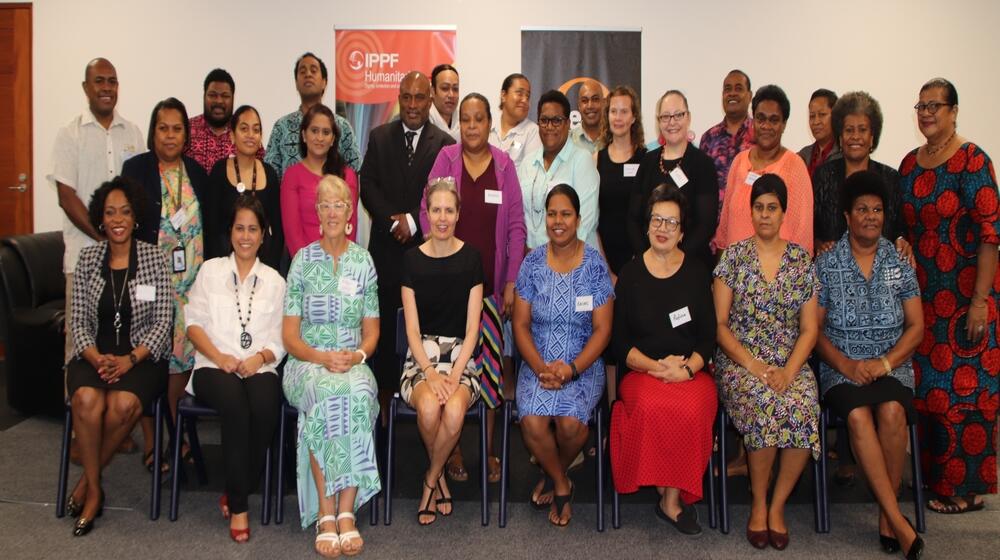A two-day workshop on Minimal Initial Service Package (MISP) Readiness Assessment (MRA) was underway on the 26th and 27th of April at the Fiji National University (FNU) campus in Suva.
The United Nations Population Fund (UNFPA) Pacific together with the International Planned Parenthood Federation (IPPF) Sub-Regional Office for the Pacific (SROP) supported by USAID, co-facilitated the MISP Readiness Assessment MRA workshop which is the first ever in the MRA process undertaken in Fiji and the Pacific. This will lead the way to produce valuable lessons around the integration of MISP in disaster policies as well as improving health system readiness to maintain a reasonable level of Sexual and Reproductive Health and Rights (SRHR) services during humanitarian events.
The MISP Readiness Assessment is a process to assess the readiness to implement the MISP for SRHR interventions during an emergency situation. The aim of the MRA is to provide a snapshot of a country’s readiness and capacity to access essential SRHR services as outlined in the MISP framework. The assessment helps to identify and prioritize key areas that need further investment to further strengthen SRHR services in Fiji.
The MISP for SRHR is a set of lifesaving priority interventions that respond to the SRHR needs of affected populations at the onset of a humanitarian crisis for example, a pandemic or a natural disaster). These needs are often overlooked and may result in potentially life-threatening consequences. It is essential to provide lifesaving SRHR services to prevent both morbidity and mortality related to SRHR and maternity care. The timely provision of these services can prevent death, illness, and disability which are related to obstetric complications, sexual and gender-based violence, unintended pregnancy, STI/HIV, and other SRHR-related conditions. This includes planning the implementation of comprehensive SRHR services into primary health care, as soon as possible following a humanitarian crisis.
Speaking at the workshop, the Hon. Dr. Ifereimi Waqainabete, Fijian Minister for Health and Medical Services (MHMS) said that after over two years of the COVID-19 pandemic and a series of severe cyclones in Fiji, the year 2022 is critical for improving the lives of women and youth in Fiji and around the world.
“Emergencies and large-scale disasters have a significant impact on health, health infrastructure, and the delivery of health care. Economic losses from these events run into billions of dollars, setting back social development gains and hard-earned health gains”, Dr. Ifereimi added.
Dr. Ifereimi believes that in emergency situations, SRHR services can be disrupted. These services need to be strengthened in preparation for future events to reduce SRH-related morbidity and mortality in times of emergencies.
“This workshop and the MISP Readiness Assessment present a unique opportunity for Fiji to build on current preparedness work informed by the lessons learned from the COVID-19 response and most recent disasters. and ensure SRHR is integrated into disaster planning, health policies, and plans, and that the objectives of the MISP are achieved in emergencies. This will ensure the rights of women, girls, people with disabilities, and LGBTQI+ communities and the dignity of all individuals” said Dr. Iferiemi.
Kathleen Taylor, Officer in Charge at UNFPA Pacific, in her opening remarks said, “as the UN’s Sexual and Reproductive Health agency, UNFPA is pleased to convene this workshop so we can collectively discuss how we can be better prepared to support women, girls, people with disabilities, LGBTQI+ communities and other vulnerable populations and ensure their sexual and reproductive health and rights in a post-disaster or post-crisis context”
In a disaster-prone country like Fiji, the Fijian Ministry of Health and Medical Services has identified the urgency to strengthen structured and targeted preparedness efforts to ensure sustainable access of vulnerable populations to critical lifesaving SRHR services as well as strengthen the overall resilience of the health system during the crisis.
The workshop has broad participation from the Fijian government, civil society organisations, partners and the UN agencies.


